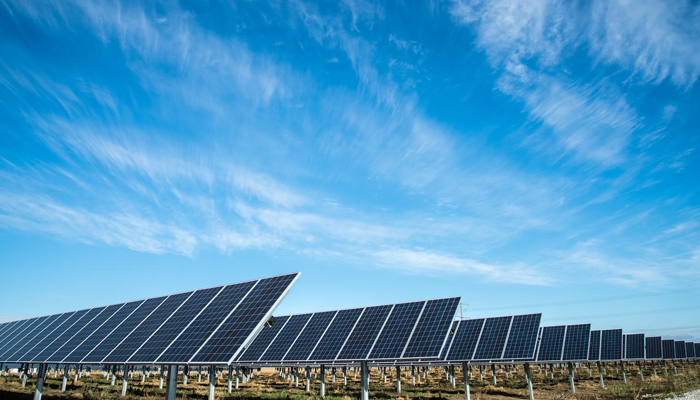Private sector urged to start clean energy projects in partnership with govt
The Sindh government will fully support the development of new clean energy projects under the public-private partnership mode to harness the vast solar and wind power generation potential of the province.
Sindh Energy Secretary Rehan Iqbal Baloch stated this while speaking as the chief guest at a seminar titled ‘Role of public-private partnerships in promoting renewable energy’ organised by the Energy Update.
He said Sindh had an abundance of resources to generate massive renewable electricity and the private sector’s support was needed to tap this potential. He said the waste-to-energy was one such mode of generating renewable electricity that was yet to be explored in urban parts of the province.
The energy secretary told the audience that the public-private partnership mode had successfully been implemented for extracting Thar coal for massive electricity production for the entire country.
“We are fully open to ideas as the private sector is more than welcome to come to us with their proposals for building new clean energy projects in the province as the Sindh government has its PPP [public-private partnership] unit for implementing such plans for the energy sector,” he said.
Sonia Ishtiaaq Soomro, strategic adviser of the Sindh Solar Energy Project, apprised the audience about the progress achieved so far in utilising the solar energy potential of the province with support from the World Bank.
She said the Sindh Solar Energy Project stood for establishing utility-scale solar parks, providing solar home systems to underprivileged people in rural areas, and using rooftops of government buildings for installing solar systems.
She informed the seminar that the Sindh government aimed to establish a solar park having the generation capacity of 400 megawatts under the public-private partnership mode by 2025. Energy expert Irfan Ahmed lamented that less than one gigawatts (GWs) of clean power based on solar energy was being produced in Pakistan when the clean energy resource could produce up to 2,900 GWs of electricity.
He suggested that the public-private partnership mode be urgently utilised to improve the functioning of loss-making power distribution companies. He also suggested that the government should minimise its involvement in the energy sector and only act as a facilitator to let the private sector come and run the affairs of power companies that have been mostly running in losses.
Rukhasana Zuberi, former chairperson of the Pakistan Engineering Council, lamented that the countries, which had launched their regulatory regimes for renewable energy projects almost the same time Pakistan introduced such systems, had shown massive growth in the production of clean electricity.
Naeem Qureshi of the Energy Update welcomed the overwhelming interest shown by the Chinese renewable energy companies in the clean energy market of Pakistan.
-
 Mexico’s President Considers Legal Action Over Elon Musk Cartel Remark
Mexico’s President Considers Legal Action Over Elon Musk Cartel Remark -
 Prince William Hits The Roof With The Andrew Saga Bleeding Into Earthshot
Prince William Hits The Roof With The Andrew Saga Bleeding Into Earthshot -
 HBO Gives Major Update About 'Industry' Season Five And Show's End
HBO Gives Major Update About 'Industry' Season Five And Show's End -
 Donnie Wahlberg Responds To 'Boston Blue' Backlash: 'Nobody Was More Disappointed Than Me'
Donnie Wahlberg Responds To 'Boston Blue' Backlash: 'Nobody Was More Disappointed Than Me' -
 Jennifer Garner Gets Emotional Over Humble Career Start: 'It Makes Me Want To Cry'
Jennifer Garner Gets Emotional Over Humble Career Start: 'It Makes Me Want To Cry' -
 Princess Beatrice Told An Acquaintance That She ‘likes’ Jeffrey Epstein: Grim Verdict Drops
Princess Beatrice Told An Acquaintance That She ‘likes’ Jeffrey Epstein: Grim Verdict Drops -
 Late Katherine Short's Neighbours Give Insights Into Her 'peace Loving' Personality Post Suicide
Late Katherine Short's Neighbours Give Insights Into Her 'peace Loving' Personality Post Suicide -
 Fresh Details Of King Charles, Queen Camilla's US Visit Emerge Amid Andrew Investigation
Fresh Details Of King Charles, Queen Camilla's US Visit Emerge Amid Andrew Investigation -
 Iran 'set To Buy' Chinese Carrier-killer Missiles As US Forces Gather In Region
Iran 'set To Buy' Chinese Carrier-killer Missiles As US Forces Gather In Region -
 Prince Harry And Meghan Unlikely To Meet Royals In Jordan
Prince Harry And Meghan Unlikely To Meet Royals In Jordan -
 Hero Fiennes Tiffin Shares Life-changing Advice He Received From Henry Cavill
Hero Fiennes Tiffin Shares Life-changing Advice He Received From Henry Cavill -
 Savannah Guthrie's Fans Receive Disappointing News
Savannah Guthrie's Fans Receive Disappointing News -
 Prince William Steps Out For First Solo Outing After Andrew's Arrest
Prince William Steps Out For First Solo Outing After Andrew's Arrest -
 Jake Paul Chooses Silence As Van Damme Once Again Challenges Him To Fight
Jake Paul Chooses Silence As Van Damme Once Again Challenges Him To Fight -
 Google Disrupts Chinese-linked Hacking Groups Behind Global Cyber Attacks
Google Disrupts Chinese-linked Hacking Groups Behind Global Cyber Attacks -
 Four People Killed In Stabbing Rampage At Washington Home
Four People Killed In Stabbing Rampage At Washington Home




